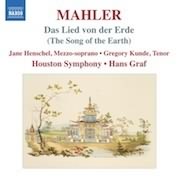So close, yet so far. Hans Graf leads an expertly paced, beautifully played performance. The solo winds of the Houston Symphony distinguish themselves throughout, and Mahler’s evocative colors (particularly the dark opening of Der Abschied) are beautifully captured. Tenor Gregory Kunde sings extremely well; his bold, heroic tone rides the orchestra confidently in the opening song, and his “Drunkard in Spring” has just the right touch of desperate bravado.
Would that Jane Henschel sounded as fine! As recorded here, she sounds the very epitome of the wobbly contralto (or mezzo, in this case). At lower dynamic levels and around the middle of her voice, as in some of the recitatives in the last song, she manages to convince, and her delivery of the text never lacks conviction or intelligence. But everywhere else the voice oscillates with a slow, aggravating tremor that makes her interpretation a true chore. Perhaps she just had a bad night, but whatever the reason, she sinks this performance as surely as the iceberg that struck the Titanic. Mahler completists surely will appreciate conductor, tenor, and orchestra, but as a totality this new release fails to measure up.
































